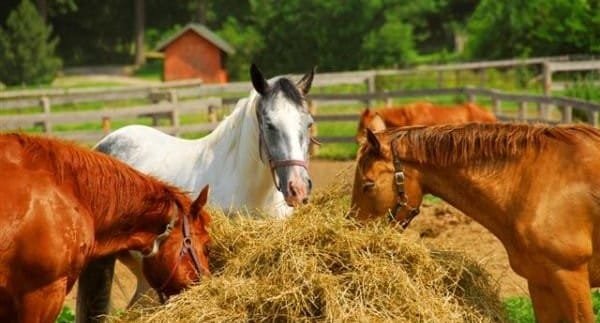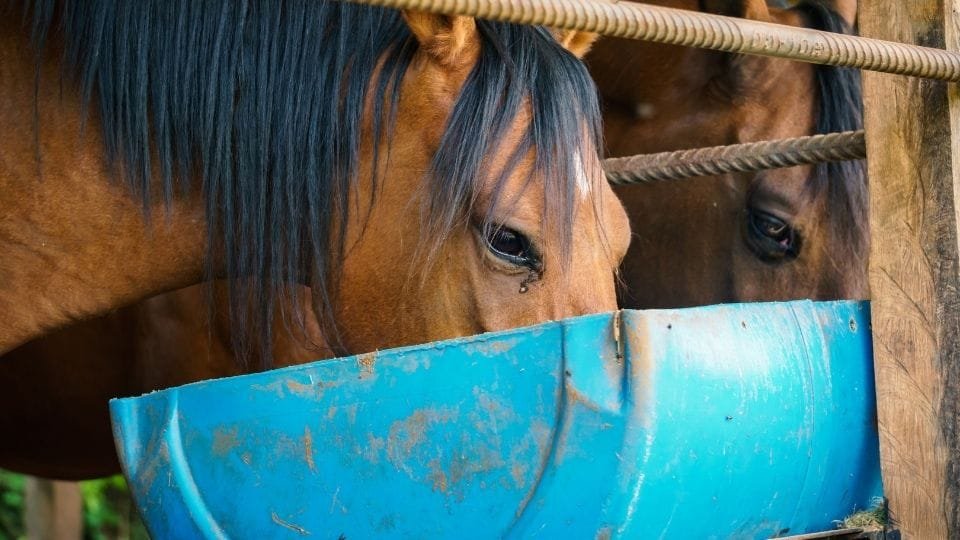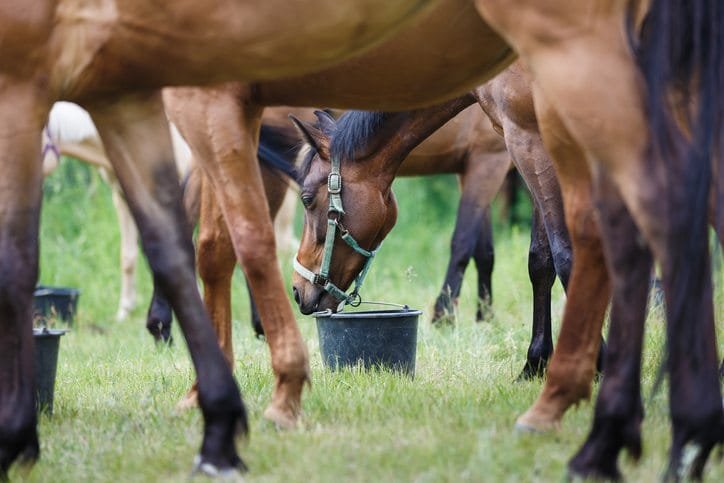Horses require a well-balanced diet to maintain their health, and their nutritional needs are typically met through three main categories of feed: roughages, concentrates, and supplements.
Understanding these categories and their roles in your horse’s diet is essential to providing proper nutrition. Below is a breakdown of these three feed categories and the most common feeds within each.
1. Roughages

Roughages are high-fiber foods that form the foundation of a horse’s diet. These feeds promote healthy digestion and provide the necessary bulk for your horse’s gastrointestinal system. Roughages primarily consist of various types of hay and grass, as well as silage.
- Hay: Hay is the most common form of roughage fed to horses. It’s a great source of fiber, which aids in digestion. There are several types of hay fed to horses, including:
- Timothy Hay: Ideal for most adult horses, especially those that aren’t in heavy work. Available in 1st, 2nd, and 3rd cuts, with 1st cut being higher in fiber.
- Alfalfa Hay: Rich in protein and energy, making it perfect for growing horses, pregnant mares, or horses in heavy work. However, it can be too rich for some horses, particularly older ones or those with weight issues.
- Meadow Hay: A mix of various grasses and plants, often chosen for its variety in nutrients. It’s a good option for many horses, though its quality can vary.
- Orchard Grass Hay: A softer, sweeter-scented hay that is gentler on horses with respiratory issues or picky eaters.
- Grass: Fresh grass is an ideal source of roughage for horses when it’s available, especially in spring and summer. Horses grazing on grass naturally fulfill their fiber requirements.
- Silage: This fermented fodder is an alternative to hay, typically used when fresh grass is unavailable or during colder months. It is particularly good for providing additional moisture and nutrients to horses but should be introduced gradually to avoid digestive upset.
2. Concentrates

Concentrates are energy-dense feeds that are used to supplement roughages when a horse’s energy needs increase. These feeds are typically high in calories and nutrients, such as protein, fat, and starch, and are given to horses who have higher activity levels, are in growth stages, or need additional energy for work or pregnancy.
- Grains: Grains are often used to provide extra energy for active horses. Common grains include:
- Oats: One of the most popular grains for horses, oats provide fiber and moderate energy. They are easily digestible and usually do not cause digestive issues.
- Barley: Slightly more energy-dense than oats, barley is often used for horses in heavy work or those needing more calories.
- Corn: A high-energy grain, corn is typically used in small amounts or as part of a mixed grain feed for horses that require extra calories. It is best fed with other grains or in balanced feeds to prevent digestive upset.
- Pelleted or Cubed Feeds: These are specially formulated, processed feeds that are easy to store and serve. Pelleted feeds often contain a mix of grains, roughages, and added vitamins and minerals to create a nutritionally balanced meal for the horse. These feeds are especially useful for horses with dietary restrictions or those needing a specific balance of nutrients.
- Complete Feeds: These are nutritionally balanced, ready-to-feed pellets that can be fed as the sole diet for some horses. These are often used when hay is not available or when horses are unable to eat sufficient roughage.
- Performance or Work Feed: These are specially designed for horses in intense training or heavy work. They are typically higher in fat and protein, providing more energy to meet the demands of physical exertion.
- Sweet Feed: Sweet feed is a mixture of grains (often oats, corn, and barley) combined with molasses, making it more palatable for many horses. While it’s high in energy, it should be fed in moderation due to its high sugar content, which can lead to health issues if overfed.
3. Supplements
Supplements are additional feed components that help ensure your horse receives all the necessary nutrients for optimal health, particularly if the horse has specific health concerns or dietary deficiencies. These are typically given alongside a balanced diet of roughages and concentrates.
- Mineral Blocks/Salt Licks: Horses need a constant supply of salt and minerals to maintain proper hydration and electrolyte balance. Salt blocks or mineral licks are often placed in the stall or pasture to give horses easy access.
- Vitamins: Some horses may require additional vitamins, especially if they are not getting enough from their regular feed. Commonly supplemented vitamins include A, D, and E, which support immune function, bone health, and overall wellness.
- Joint Supplements: For horses that are in heavy work, have joint issues, or are aging, joint supplements containing glucosamine, chondroitin, and MSM (methylsulfonylmethane) can help support joint health and mobility.
- Probiotics: These are beneficial bacteria that help maintain gut health, particularly during periods of stress, illness, or antibiotic treatment. Probiotic supplements help keep the digestive system balanced and improve nutrient absorption.
- Electrolytes: These supplements are particularly important for horses that sweat heavily, such as those in work or training, or horses in hot climates. Electrolytes help replace lost salts and minerals and support hydration.




